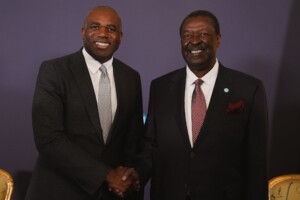Talks between Sudan’s FFC and rebels show progress
Yasir Arman, leader of the Sudanese Revolutionary Front (SRF) coalition of armed movements, has announced the agreement with the Forces for Freedom and Change (FFC) on 11 points in the document on the transition to peace, which has been discussed in the Ethiopian capital of Addis Ababa over the last few days.
 Yasir Arman, leader of the Sudanese Revolutionary Front (SRF) (File photo)
Yasir Arman, leader of the Sudanese Revolutionary Front (SRF) (File photo)
Yasir Arman, leader of the Sudanese Revolutionary Front (SRF) coalition of armed movements, has announced the agreement with the Forces for Freedom and Change (FFC) on 11 points in the document on the transition to peace, which has been discussed in the Ethiopian capital of Addis Ababa over the last few days.
Arman said there was only one point left in the talks, but no agreement had yet been reached on how to set up the transitional bodies, including peace issues and with the broad participation of armed forces.
He explained that the parties are currently within one month of a peace agreement between the SRF, the FFC, and the leaders of the Sudanese revolution to put the country on the verge of ending the war.
He stressed the keenness of the SRF on the unity of the FFC and to reach consensus among the Sudanese and the transition to the civilian government.
Sudanese Professionals Association
The Sudanese Professionals Association (SPA) said the consultations currently underway in Addis Ababa, “are not quotas or the division of chairs for the people to bully each other”.
On Monday, the SPA said in a statement that it was seeking, through consultations with the armed movements, to arrange a comprehensive and satisfactory peace process for all parties during the transitional period.
He stressed that the consultations are for the sake of guarantees and obligations owed to the people of Sudan who have been exhausted by wars.
The statement stressed that the parameters of the revolution will not be completed only by achieving a comprehensive and just peace that will do justice to all Sudanese, especially our people in areas of conflict and war.
National Umma Party
The President of the National Umma Party (NUP), El Sadig El Mahdi, stressed the need to seek a comprehensive and just peace in the country, saying that it is a priority for the next stage.
Yesterday, El Mahdi called in an interview with Sky News Arabia for the acceleration of the stability of a sovereign country to avoid further economic deterioration.
He said that what was agreed in the country is a public interest for all.
He added: “The members of the Sovereign Council, the government and the heads of state must be experts.”
Darfur Bar Association
The Darfur Bar Association said that the two main negotiating parties have opened external negotiating tracks with the armed movements, maintaining the exceptional conditions.
The association said in a statement on its observations on the political agreement to establish structures and institutions of governance in the transitional period between the military junta and the FFC, said that the quota of power will disrupt the procedures to restore the country's constitutional life and hand over power to an elected civilian government.
The statement said that the armed movements participated in the masses among the Sudanese people in the revolution and their right to participate in the arrangements of the transitional period, like others on an equal footing.
The association pointed in its statement that there are now two tracks, the first of which is to form a civilian government and negotiate with the armed movements to settle the issues of war and peace on fair basis and this is consistent with the demand of the SPLM North of El Hilu leadership, the second track is that other subsequent agreements with the armed movements will be established to merge with the political agreement between the military junta and the FFC, as announced in N’Djamena, Juba, and Addis Ababa.
“The first track, if established, could pave the way for the formation of a stable and homogenous civilian government that would be qualified to discuss and consider all issues of war and peace in a strategic and comprehensive manner, while the second track, if established, could divert the efforts of the transitional period to divide the power and its spoils, which may lead to consequences that affect the overall stability of the country”, the Bar Association statement concludes.
Our editorial independence means that we can continue to provide factual updates about political developments to Sudanese and international actors, educate people about how to avoid outbreaks of infectious diseases, and provide a window to the world for those in all corners of Sudan. Support Radio Dabanga for as little as €2.50, the equivalent of a cup of coffee.












 and then
and then